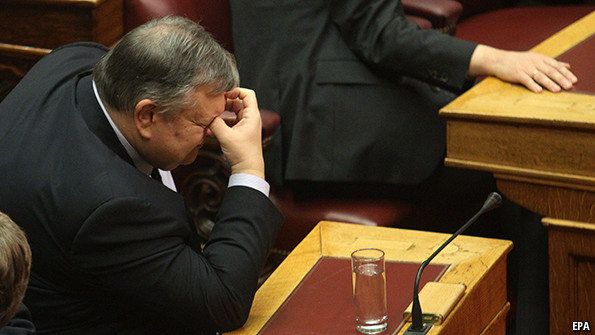First-round failure
Stavros Dimas's chances look poor, while those of the anti-austerity left look good

FOR an election in which so much is at stake, the
atmosphere in the first-round voting in Greece’s presidential election
on December 17th was almost humdrum. As predicted, Stavros Dimas, the
only candidate for the head of state’s largely ceremonial job, failed to
gain the needed two-thirds majority, winning just 160 of Greece’s 300
parliamentary deputies. Mr Dimas's allies, including Evangelos
Venizelos, the foreign minister (pictured), are growing worried. Should
Mr Dimas’s backers fail to win over enough deputies by the third and
final vote on December 29th, Greece must hold a snap general election.
If current polls are to be believed, that could bring to power a radical
left-wing government which would reopen the cursed issue of Greece’s
public debt that first precipitated the euro crisis.
Mr Dimas could yet sneak through; all of
the governing coalition’s 155 deputies supported him. But he attracted a
disappointing five votes from the 24 unaffiliated lawmakers who could
tip the balance in his favour. Political matchmakers from the
centre-right New Democracy party of Antonis Samaras, the prime minister,
and its coalition partner, Mr Venizelos's Panhellenic Socialist
Movement (Pasok), must somehow put together 180 votes for Mr Dimas to be
approved in the final round. In the corridors of parliament on
Wednesday evening, even some centre-right deputies warned that they
would fail, and that new elections were coming.
The presidential vote was initially
scheduled for February, but Mr Samaras brought it forward, saying the
hard-left Syriza party’s calls for an early election were damaging the
country’s fragile recovery. Syriza’s promises of a moratorium on debt
payments and an expansive fiscal policy have met with a chilly response
in Brussels and Berlin, but they appeal to austerity-weary Greeks. Since
coming first in last May’s European parliament elections, Syriza has
kept a steady lead in opinion polls. Alexis Tsipras, the party’s
firebrand leader, accuses Mr Samaras and the European Commission of
using scare tactics against his party. After Wednesday’s vote, a smiling
Mr Tsipras declared that “you can’t blackmail democracy”.
Backroom wheeling and dealing is rife. To
scrape together a win for Mr Dimas, the government needs not just the
independents (nine have vowed not to back Mr Samaras) but defections
from two small parties, the moderate Democratic Left and the right-wing
Independent Greeks. Recent polls suggest both parties would fail to win
3% of the vote at a general election, the threshold for entering
parliament. Fotis Kouvelis, the Democratic Left leader, has sent
ambiguous signals as to whether he will forgive any of his 10 deputies
who decide to back Mr Dimas. But several Democratic Left deputies are
reportedly negotiating behind the scenes for a place on Syriza’s
electoral list.
Panos Kammenos, leader of the Independent
Greeks, insists his 12 MPs will vote against Mr Dimas in the final
round. If the government falls, the consequences for Greece and for
Europe could be dramatic. But some observers think this grave issue may
be decided not by national interest or even party discipline, but by the
self-interest of MPs in both splinter groups. If the government serves
out the remaining 17 months of its term, lawmakers will be entitled to a
significantly larger pension.

No comments:
Post a Comment